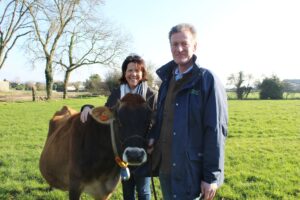By Gavin Ashenden

Even in a small and compact island like Jersey, the culture of the town and the culture of the countryside are very different.
In a well-run and sane society, they should interact in a complementary way. But the capacity for misunderstanding between the two cultures goes back a long way.
In one of our oldest pieces of literature, Aesop’s fables written in the 5th Century BC, there is the famous story of the town and country mouse.
In this very old story, a proud town the town mouse decides to go and visit his cousin in the country. The country mouse is delighted to welcome him with a meal of simple but excellent country cuisine. Sadly, the city mouse it not impressed and explained to his country cousin that he if he wants really good food, he will need to visit him at his home in the city for a taste of the fine life.
And so, the country mouse makes a return visit and visits his cousin in the town. There the town mouse provides a sumptuous meal of white bread and a variety of other fine foods which as he promised only the city can offer.
However, in the middle of their wonderful meal they find themselves interrupted by the threatening presence of a cat. As soon as the cat appears both mice have to abandon their sumptuous banquet and scarper back into their Mousehole for safety.
Then the town mouse confines in the country mouse that he has in fact, had had dreadful trouble with this cat; and indeed, this cat killed both his mother and his father and is frequently trying to catch him as well.
After hearing this terrible and frightening tale of the predatory cat, the country mouse decides to return home to the safety of the countryside. He explains that he prefers security to opulence; or as a 13th century commentator phrased it “I would prefer to gnaw on a bean than be gnawed by continual fear.”
This archetypal history continues to this day amongst humans. You get better restaurants in the city, but no mugging in the countryside. Both city and country dwellers think their way of life is the best.
But recently there have been unusually muscular assault on the farmers of Europe. The vigour with which the Dutch government has set out to destroy its farming community and industry has been astonishing. You may not have seen the pictures of miles and miles of tractors blocking Dutch motorways and city centres, because for reasons that are not immediately transparent, the media have not chosen to cover the story for the wider public in Europe.
At least not until the recent elections when the BBB, the Farmer Citizen Movement, pulled off an extraordinary showing, to challenge the power of the status quo which seemed set on destroying them.
The justification for the Dutch Government’s threat to Dutch farmers springs from the European Union’s recent emission reduction rules. These were produced a response to the eco-apocalypse narrative that all good Green believers, in and out of government, have been experiencing profound alarm over.
As with Covid, there are two sciences. One which produces figures and computer models that justify the alarm, and one that challenges the alarmism. But as also with Covid, for reasons which again are also not transparent, the media bans any reference to the non-alarmist science, making it difficult for the ordinary citizen to make up his, her, or their mind, and to know how to express a view democratically.
The alarmist eco-crisis science has persuaded all right-thinking governments, but especially the Dutch, to enforce a cut of Nitrogen emissions of 50%.
While large farming companies have the means to meet these goals — by using less nitrogen fertiliser and reducing the number of their livestock — smaller, often family-owned farms would be forced to sell or shut down. In fact, according to a heavily redacted European Commission Document, this appears to be the strategy’s ultimate goal: ‘extensifying agriculture, notably through buying out or terminating farms, with the aim of reducing livestock’; this would ‘first be on a voluntary basis, but mandatory buyout is not excluded if necessary.’
Agriculture presently accounts for almost half of the country’s output of carbon dioxide, yet the Netherlands is responsible for less than 0.4% of the world’s emissions. No wonder many Dutch fail to see how such negligible returns justify the complete overhaul of the country’s farming sector, which is already considered one of the most sustainable in the world: in fact over the past two decades, water dependence for key crops has already been reduced by as much as 90%, and the use of chemical pesticides in greenhouses has been almost completely eliminated.
Jordan Peterson has interested himself in both the science and the politics, in a far-ranging YouTube conversation: – https://www.youtube.com/watch?v=pqHQN54XCL0&t=3519s, and there is evidence that this may play a part in a far wider programme for widespread urbanisation at the expense of the countryside.
And yet as the farmers have pointed out, ‘No farmers no food’; a slogan that managed to get through the alarmist eco haze that the media had shrouded the public in, and produced a platform at the polls to threaten a democratic challenge to an, as yet, unaccountable policy.
Critics of the net zero campaign have pointed out that whether the apocalyptic computer models can be relied on or not, there is a real danger that the medicine that eco-alarmists force on Western economies may cause even more damage than the threats to the environment presently do.
The old stand-off between town and country has morphed under the pressure of globalization and eco-alarmism into a cross-national programme of take-over and eradication. Over the course of the next generation or so, has the country mouse any future, or have the muggers moved out beyond the boundaries of the city?
Dr Gavin Ashenden is a Catholic layman, author and commentator, and associate editor of The Catholic Herald. Formerly a priest of the Church of England, and subsequently a continuing Anglican bishop he was appointed Chaplain to the Queen from 2008 until his resignation in 2017




